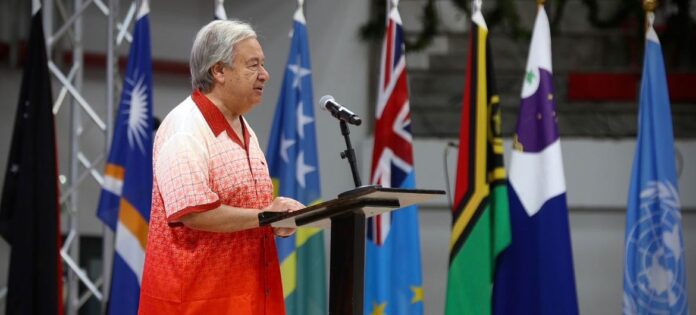NUKU’ALOFA: At a press conference in called on world leaders to take urgent action on climate change. He highlighted the unprecedented rise in global sea levels, which are climbing at rates not seen in 3,000 years. This increase is primarily due to greenhouse gases from burning fossil fuels, which are causing global warming and subsequent sea level rise, reported the United Nations (UN).
Guterres referenced two critical UN reports released that day. The World Meteorological Organization’s study and a UN Climate Action Team report both indicate that oceanic changes are accelerating, with more frequent and severe marine heatwaves, record-breaking sea temperatures, and increased coastal flooding.
“Pacific Island nations are in grave danger. Relative sea levels in the Southwestern Pacific have risen even more than the global average. But what happens here doesn’t end here. Surging seas are coming for us all, threatening coastal areas around the world. The world must look to the Pacific & listen to the science. If we save the Pacific, we also save ourselves,” Guterres said.
The Southwestern Pacific, in particular, has experienced sea level rise more than double the global average over the past 30 years.
Pacific islands, which are exceptionally vulnerable due to their low elevation and dense coastal populations, face severe risks. Without significant reductions in emissions, sea levels could rise by at least 15 centimetres by mid-century, with frequent coastal flooding becoming a common issue.
The Secretary-General warned that a global temperature increase of 2°C could lead to the collapse of major ice sheets, resulting in sea level rises of up to 20 meters over millennia. With current trends pointing towards a 3°C rise, the situation could become even more catastrophic, affecting coastal regions worldwide, reported the UN.
Guterres stressed the need to limit temperature rise to 1.5°C, requiring a 43% reduction in emissions by 2030. He urged governments to submit updated climate action plans by 2025 and to swiftly phase out fossil fuels while boosting renewable energy and ending deforestation.
The UN reported that he also called for increased financial support for vulnerable countries and urged wealthy nations to fulfil their climate finance commitments, including doubling adaptation funding to $40 billion annually by 2025.
Looking ahead to the UN climate conference, Guterres emphasized the need for innovative financing and equitable transition strategies. He highlighted the importance of establishing early warning systems for all by 2027 and enhancing data capabilities for better adaptation and coastal planning. (ANI)
Also Read: Climate change can no longer be ignored: CJI







